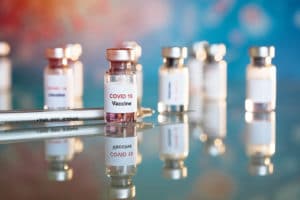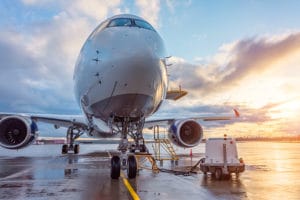The current health crisis is forcing carriers and airlines to question their logistical capacity for vaccination flights in order to cope with countries’ vaccination policies. Indeed, the routing and supply of vaccines are necessary challenges. According to the International Air Transport Association (IATA), transporting the Covid-19 vaccine would require the mobilisation of at least 1000 Boeing 747s. While the United States has already ordered some 100 million doses of Covid vaccine and the European Union is requesting 200 million doses, the issue of air logistics is closely linked to population vaccination programmes. Indeed, as the health crisis affects the entire planet, vaccines must be transported as quickly as possible and everywhere. Producing a vaccine is essential, but can civil aviation organise an efficient air network to distribute it?
Aviation and transport of the Covid-19 vaccine
In September 2020, IATA alerted the aviation community to the need to participate in the transport of Covid-19 vaccine in order to ensure vaccination programmes. Designated as a mission of global importance in the air cargo community, aviation has been preparing for several months now to take up the challenge that could finally stop the epidemic. Manufacturing vaccines takes time, so it was necessary to anticipate and force the world of aeronautics to think about specific logistical solutions.
Indeed, since the beginning of the health crisis, companies have had to reinvent themselves by using airliners for cargo flights, even though these planes are not necessarily adapted to such missions. The same applies to the transport of pharmaceutical products such as vaccines, which require specific precautions, standards and transfer conditions. Indeed, a vaccine must be transported quickly to where it is needed. Thus, cargo planes seem to be the most suitable aircraft for this particular need.
The stakes of medical chartering: what are the conditions for transporting a vaccine?
The health authorities require the vaccine to be transported under the best possible conditions in order to avoid undesirable effects, including product alteration.
The cold chain
The transport of certain pharmaceutical products such as vaccines requires constant temperature control when moving them from point A to point B. They are called temperature-sensitive products. Why is this vaccine cold chain necessary? According to health professionals, it ensures that the quality of the vaccine is not altered from the time it is manufactured to the time it is administered. Thus, a vaccine must be transported within certain temperature ranges recommended by the World Health Organization (WHO).
What temperatures are therefore recommended for vaccines? Most vaccines should be stored between 2 and 8 degrees Celsius, while others require freezing temperatures. Therefore, each vaccine has its own cargo plane that meets the appropriate conditions for proper transport. Air-conditioned bunkers and refrigerated containers are then essential to maintain the vaccine cold chain throughout the flight.
- Vaccines between 2 and 8 degrees
Most vaccines must be transported at between 2 and 8 degrees Celsius so as not to break the vaccine cold chain. They need passive refrigeration solutions such as special packaging to keep them at the right temperature, as well as an air-conditioned bunker as mentioned above.
- Frozen vaccines
Frozen vaccines require a different type of packaging so as not to alter their quality and effectiveness at the time of administration. This requires the use of dry ice containers as well as active electronic temperature control systems that require special attention during the flight. Using indicators, the crew on board controls the temperature so that the vaccines remain in a frozen state.
Avoid light
If a vaccine is exposed to light it may lose its effectiveness, so contact with the sun or any artificial light should be avoided. To avoid this type of deterioration, vaccines are often wrapped in overwrapping that protects them during transit, in addition to darkening of the glass.
Speed requirement
In order to preserve the quality of the vaccines, the speed of transport remains one of the essential parameters, which explains why air freight is most often preferred. No delays need to be recorded. In the current crisis we are going through, it is also demanded that the vaccine be distributed everywhere and as quickly as possible in order to preserve human lives and the global economy. The challenges are great. Nevertheless, organising the vaccine flight is all the more complicated as many airports do not have sufficient capacity to keep up with the pace, especially today.
Safety element
Vaccine freight also requires that the products be shipped in the safest possible way. Indeed, the demand for certain vaccines such as Covid-19 is so high that these products require special attention as their value is priceless. There can sometimes be fake vaccines or even theft of goods, which implies the organisation of a reliable and solid security structure in the aircraft and within the airport structures. For example, the airline handling the cargo is responsible for the protection of the vaccines during the entire flight and must therefore develop a system accordingly.
Public health and vaccinations in France
Since December 27, it has been possible to be vaccinated in France with the Pfizer BioNTech vaccine. Indeed, the campaign has been launched with, as the first people to be vaccinated, the elderly living in communities and the health professionals most at risk. The most vulnerable people will then be vaccinated, but for the moment there is no vaccination requirement on the part of the State or the Ministry of Health. The vaccination schedule should adapt to the doses France receives as and when they are delivered. Important to know: the vaccine is free for everyone.
Flying with AEROAFFAIRES ?
Would you like a quote for a safe trip with AEROAFFAIRES? We adapt ourselves to the sanitary requirements. Do not hesitate to contact us on +33 1 44 09 91 82, our experts are at your disposal.




